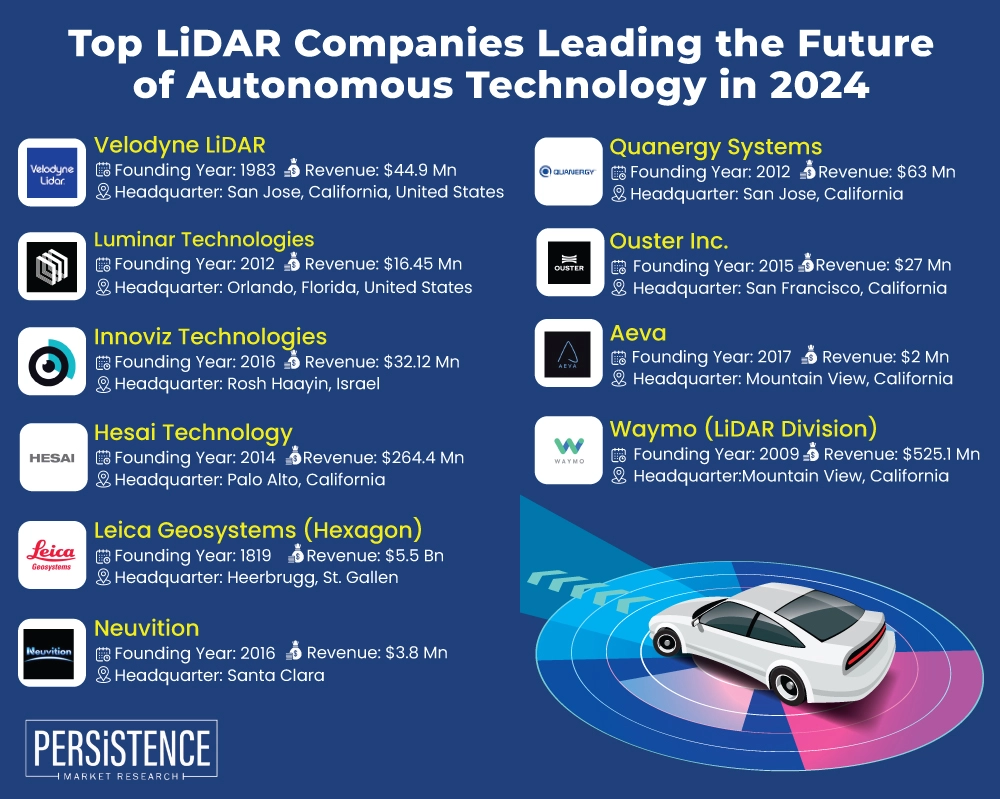- Blog
- Top Lidar Companies Leading The Future Of Autonomous Technology In 2024
Top LiDAR Companies Leading the Future of Autonomous Technology in 2024
Published On : 24 Oct 2024
Light detection and ranging technology, commonly known as LiDAR, has become one of the hottest trends in autonomous systems, mapping, and industrial automation. It is being widely adopted in a variety of industries, ranging from autonomous vehicles and drones to environmental monitoring, construction, and smart cities.
The growing interest in LiDAR is mainly driven by its ability to provide high-precision, real-time 3D data that can be used for object detection, navigation, and environmental scanning. With the rise of autonomous systems and high demand for accurate geospatial data, LiDAR technology is playing a key role in shaping the future of these industries.
As advancements in LiDAR sensors continue to make the technology more compact, affordable, and accurate, its applications are expanding rapidly. The integration of LiDAR in automotive is a key driver, as it enables cars to ‘see’ their surroundings in real-time, ensuring safety and efficiency. Additionally, sectors such as construction, mining, and agriculture are leveraging LiDAR for better project planning, resource management, and automation.

From Mapping to Mobility, LiDAR Technology is Transforming Various Industries
The adoption of LiDAR technology is opening a range of new opportunities across various industries. In the automotive industry, LiDAR sensors are integral to the development of self-driving cars. These help them navigate complex environments by detecting obstacles, pedestrians, and other vehicles. The precision of LiDAR ensures that autonomous systems can make quick, informed decisions.
- In September 2024, for example, Hesai Technology, a China-based LiDAR technology provider, launched the OT128, its new solution. Its target is the ever-evolving fields of autonomous last-mile delivery vehicles, harbor trucks, and shuttles.
LiDAR-equipped drones, on the other hand, are transforming industries such as agriculture, forestry, and mining. These are providing accurate data for resource management, environmental monitoring, and topographic mapping.
LiDAR technology is further being used in urban planning and smart city development to monitor traffic, assess infrastructure, and optimize public services. Its ability to create real-time 3D maps enables city planners to make data-driven decisions.
LiDAR has also revolutionized the surveying industry, providing quick and highly accurate data collection for projects such as construction, mining, and archaeology. It has successfully replaced traditional surveying methods, offering more detailed topographic maps in a fraction of time.
Top 10 LiDAR Companies in 2024 Establishing Unique Pathways
1. Velodyne LiDAR
California-based Velodyne is one of the pioneers in the LiDAR market, known for its high-performance sensors that are widely used in autonomous vehicles, drones, and robotics. The company’s sensors are known for their accuracy, durability, and ability to function in challenging environments. Velodyne's technology is trusted by several automotive manufacturers and tech companies involved in the autonomous driving space.
2. Quanergy Systems
Quanergy Systems, based in California, is a leading provider of solid-state LiDAR sensors, offering highly compact and cost-effective solutions for automotive and industrial automation. The firm’s sensors are particularly suited for smart city applications, where they are used for monitoring traffic and infrastructure.
3. Luminar Technologies
Florida-based Luminar specializes in long-range LiDAR sensors, which are essential for ensuring the safety of autonomous vehicles at highway speeds. The company has gained attention for its partnerships with leading automotive manufacturers, including Volvo and Daimler, to integrate its sensors into self-driving cars.
4. Ouster Inc.
Ouster, headquartered in California, provides digital LiDAR solutions with a focus on versatility and scalability. The company’s sensors are used in a wide range of applications, right from autonomous vehicles and drones to robotics and industrial automation. The company’s digital approach to LiDAR helps reduce costs while maintaining high performance.
5. Innoviz Technologies
Innoviz, based in Israel, is a key player in the automotive LiDAR market, offering sensors that meet the strict performance and safety requirements of autonomous vehicles. The company's LiDAR systems are designed for long-range detection and are being integrated into the systems of top-tier automotive manufacturers like BMW.
6. Aeva
Aeva, headquartered in Israel, is focused on developing next-generation LiDAR technology that integrates velocity detection and 3D mapping. Its unique approach, which combines LiDAR with Frequency-Modulated Continuous Wave (FMCW) technology, allows for high-resolution perception at long distances, a critical feature for autonomous driving.
7. Hesai Technology
China-based Hesai is a leading LiDAR company, known for its high-performance sensors used in autonomous vehicles, drones, and robotics. It has gained recognition for its robust and reliable LiDAR solutions, which are used in various industries to improve safety and efficiency.
8. Waymo (LiDAR Division)
California-based Waymo, a subsidiary of Alphabet, has developed its own proprietary LiDAR technology for use in its autonomous vehicles. The company’s sensors are designed for long-range detection and are a key component of its self-driving system. It has also started selling its LiDAR sensors to other firms.
9. Leica Geosystems (Hexagon)
Leica Geosystems, part of the Hexagon Group, is known for its high-precision surveying equipment, including LiDAR sensors used in mapping, construction, and infrastructure projects. The Switzerland-based firm’s LiDAR solutions are trusted by geospatial professionals for creating detailed topographic maps and models.
10. Neuvition
California-based Neuvition specializes in high-resolution, multi-line LiDAR systems that offer superior data density and accuracy. Its LiDAR technology is used in applications such as smart city infrastructure, autonomous vehicles, and industrial robotics, helping to improve safety and operational efficiency.
The Future of LiDAR Technology Seems Bright as New Application Areas Emerge
Ongoing innovations in robotics are likely to push the integration of LiDAR systems into several industries. Companies are anticipated to introduce novel LiDAR features, such as high accuracy and ability to collect real-time data.
Unmanned Aerial Vehicles (UAVs) and robosweepers equipped with LiDAR technology are projected to emerge in the next ten years. These are estimated to bolster navigation and perception capabilities by using 3D scanning technology.
In the manufacturing sector, LiDAR systems are anticipated to find extensive use to better understand the spatial relationships between various objects. This can further help with the proper placement of products on the assembly line. Rapid advancements in this field are estimated to create novel growth opportunities in the near future.
Industry Report

Request Report Sample
Your privacy is important to us; your data is secure
Contact Us
Latest Reports
-
Ammonium Polyphosphate (Phase II) by Product Type (Melamine Coating, Silane Coating, Non-Coated), Form (Powder, Liquid, Granule), End-user Industry (Construction, Textiles, Electronics), Application (Flame Retardant, Others), and Regional Analysis 2026 – 2033.
-
Aerospace Fasteners Market by Material Type (Aluminum, Titanium, Stainless Steel, Superalloy, Others), Superalloy Material (A286, Inconel 718, Waspaloy, Others), Application (Airframe, Engine, Interiors, Others), and Regional Analysis for 2026 – 2033
-
Esophageal Atresia Treatment Market by Surgery Type (Primary Anastomosis, Others), Treatment Approach (Surgical, Others), Distribution Channel (Hospital Pharmacies, Others), End-user (Hospitals, Others), and Regional Analysis 2026 – 2033
-
Intelligent Document Processing Solution by Technology (OCR, Machine Learning, NLP), Deployment (Cloud, On-Premises), Component (Solutions, Services), Industry Vertical (BFSI, Healthcare, Manufacturing, Others), and Regional Analysis 2026 – 2033
-
High Temperature Resin Market by Resin Type (Polyimide, Epoxy, Others), Application (Aerospace, Automotive, Others), End-user (Automotive & Transportation, Others), and Regional Analysis for 2026 – 2033
